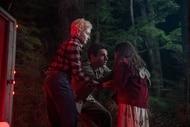Create a free profile to get unlimited access to exclusive videos, sweepstakes, and more!
Could time travel change the past, like Umbrella Academy suggests?

The latest season of Netflix's The Umbrella Academy picks up moments after, and several decades before, the end of the world witnessed in the Season 1 finale. In a sort of chronological Hail Mary pass, Five sends the Hargreeves troupe back in time in a last-ditch attempt to undo the apocalypse. The only trouble? It follows them.
It’s a take on the well-worn time-travel trope, wherein well-meaning travelers visit their own pasts and change the future. Almost always for the worse.
IS TIME TRAVEL EVEN POSSIBLE?
While time travel is generally regarded as little more than a plot narrative for science fiction romps, it is actually a question of some interest to both scientists and philosophers. There is nothing inherent in the known laws of physics that unequivocally prevents time travel. In fact, time travel to a distant future appears to be absolutely allowed, and we have a pretty strong understanding of how it could be accomplished, even if we don’t yet have the technology to pull it off.
It’s well established that clocks tick more slowly the closer they approach the speed of light. This isn’t any glitch in their hardware, but a result of a change in the experience of personal time. This same effect also applies to people.
If we could devise a spacecraft that closely approached the speed of light and sent it on a long round trip with a crew aboard, they would experience significantly less time than those of us who remained back on Earth. It isn’t quite as glamorous as a machine blipping out of existence and arriving instantaneously in a far-distant time, but it would work.
Traveling to the past, however, is another matter. There are solutions to General Relativity that allow matter to arrive at the end of a trip a moment before the trip began. Importantly, though, these sorts of phenomena have never been observed in nature.
If time travel doesn’t violate the known rules of the universe, the question then becomes: Why don't we see it happening? There are, of course, particles that move at incredible speeds, and there are regions of spacetime that are bent to an advanced degree by the presence of gravity, namely the regions around supermassive black holes.
The universe is large, and we can’t suppose to know everything within it, but it is telling that we’ve seen no direct evidence of backward time travel, in a system that seems to allow for it. If there are time travelers, it’s pretty rude they didn’t show up to Stephen Hawking’s party.
It’s possible, even likely, our understanding of the universe is incomplete and the fact that time travel is apparently allowed is simply a failure of our understanding of the cosmos. A fuller understanding of quantum gravity may reveal the error of our ways.
But let’s suppose that backward time travel is actually possible for macroscopic objects, including people. How do we avoid mucking up the timeline?
COULD WE CHANGE THE PAST AND WRECK THE PRESENT?
It’s a staple of nearly every well-known time-travel story. Marty McFly went back in time and had to spurn the advances of his own mother in order to prevent his own annihilation. Kyle Reese traveled back in time to prevent the meddling of a futuristic Terminator and ensure the birth of humanity’s savior. In Looper, time-traveling hitmen are killed in the present by killing them in the past. It makes good story fodder, but it probably isn’t possible, even in a world where time travel is.
Time, as we experience it, happens linearly. One moment follows another. The past is locked in moments gone by, unchangeable. The future is murky, unknown, and full of possibility.
We innately understand and accept that our agency as freely acting individuals does not extend to the past. We cannot undo or otherwise change things that have gone before, no matter how much we might sometimes want to. The future, on the other hand, is not so static.
We believe (at least most of us do) we have the ability to choose, to take action in the here and now that will affect the trajectory of our futures and the futures of those around us. And this is the central concept surrounding time travel and paradoxes.
Once a person has traveled to the past, that past becomes their future again. Those moments no longer feel as though they are etched in stone. We have the ability to act and, most importantly, to act in a way contrary to how we acted the first time, with the benefit of prior knowledge. We feel as though we can change things.
The paradox arises from a dissonance between two firmly held beliefs, that the past is immutable and that we have agency. Both of these cannot be true. And our belief in free will is so strong, the only conclusion most of us can make is that we would have the power to change the course of time.
The question then becomes whether we actually have the ability to impact the flow of time. Are we free agents, part of, but separate from, the rest of the universe, or is that only a persistent illusion?
In short: Is there any definable difference between past and future, outside of our ability to know one and not the other?
According to Albert Einstein, the author of relativity, there is not. He believed in what’s known as a Block Universe, a static block of spacetime wherein all of space and all of time exist on equal footing. This conclusion arrives from the math; though the passage of time is something we experience, it has no real bearing on the numbers. The physics work the same whether time is running forward or backward. The universe, on the whole, doesn’t seem to care about time, except as an expression of entropy, the flow from order to disorder.
It’s worth noting that not all modern physicists agree. The Block Universe is not, if you’ll excuse the nomenclature, universally accepted. Though it is the generally accepted view of reality.
What is undisputed, though, is causality: the process by which past events dictate present ones and present events dictate future ones. It’s difficult to imagine a world wherein this doesn’t ultimately lead to a Block Universe. If the laws of the universe are real, and causality is unbroken, then all of time, from the Big Bang to the end of existence, is determined from the jump. Whether we have yet perceived it or not is irrelevant.
The debate over determinism and free will is unlikely to be settled anytime soon, but the nature of causality is not in question. And traveling back in time would violate it. No longer would we have an unbroken chain of events, one preceding the other.
Backward time travel would introduce an uncaused cause, and that’s something the universe seems to strongly oppose.
While physics, as we currently understand it, does not prevent the existence of closed timelike curves (CTC), it apparently demands those curves remain consistent.
In experiments led by Seth Lloyd of MIT, quantum systems were employed to simulate how a closed timelike curve would work.
In order to replicate a situation as one might encounter inside a CTC, the researchers stored two qubits, with opposite states, inside an electron.
They found that the qubit representing the time traveler could only make the jump if the end result matched the starting conditions. In short, their simulated time travel was only possible if causality remained consistent. If nothing was changed.
The qubits were entangled and their states measured, then the traveler attempted to change the state of the other. This action was a stand-in for killing an ancestor, in the way of the classic grandfather paradox.
Similar experiments, these involving particles, found consistent results. Sending particles back in time in an attempt to alter causality doesn’t work. The universe conspires to maintain consistency. Researchers found that physical consistency was a requirement and any changes attempted in the past must be corrected for such that the present and future are not altered.
In essence, the closed timelike curves that are allowed to occur are post-selected for only those in which causality is not violated. This might allow for some variation in events, but consistency is always maintained.
These results really aren’t all that surprising. They’re built into the very nature of closed time-like curves; they’re loops, bits of time circling back on themselves, not fractured bits, splintering off from the rest of time. Anything that happens in this new past must, by definition, have always happened. Even if a traveler's experience in the past is novel for them, it isn’t for the timeline on the whole. Nothing has changed, save for your perception of things.
This doesn’t, of course, account for the notion of fractured timelines, the idea that changing the past creates an alternate reality with a different future than the one you hailed from.
Even then, you haven’t really changed the past. The path of time in your originating universe proceeds as it always did. As does the path of time in your new universe. And your time machine is now more of a universe hopper than anything else. Again, only your perception is changed.
We can all rest assured, though, that even if we do eventually crack the code on time-skipping, causality will remain unbroken, the fate of the universe is not in danger, and there’s nothing we can do to change that. There’s some comfort there.




























